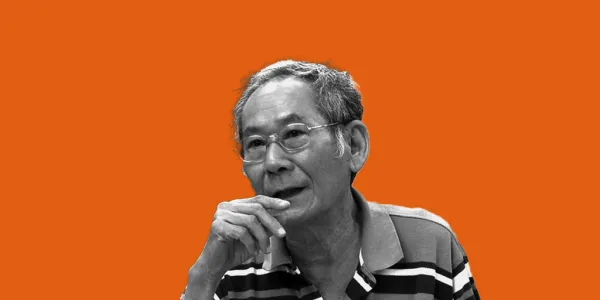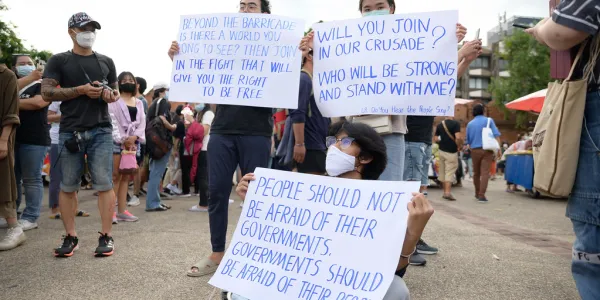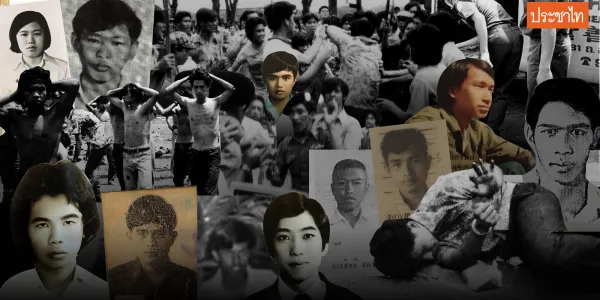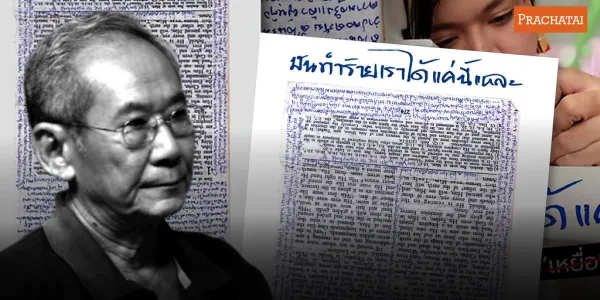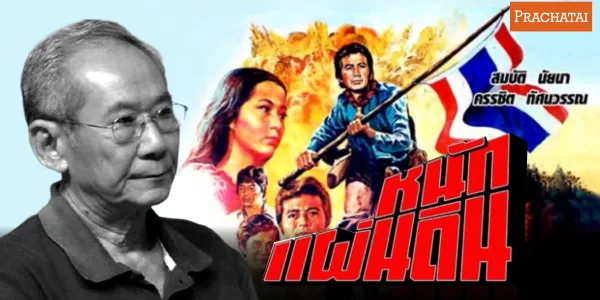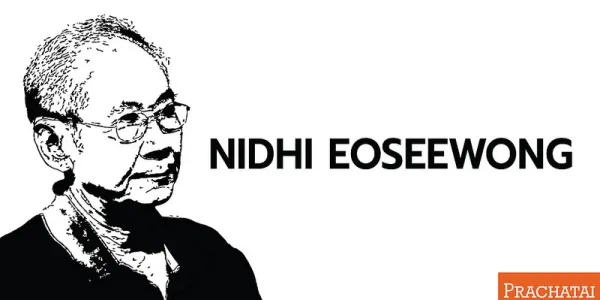By Prachatai |
Historian, writer, and political commentator Nidhi Eoseewong has died today (7 August 2023) at the age of 83, after being hospitalised for lung cancer.
By Nidhi Eoseewong |
<p><em>On 13 August 2020, historian Professor Nidhi Eoseewong released a written statement about the 6 October 1976 massacre to the public after a news agency incorrectly reported the views he shared during an interview. Prachatai disseminated the statement in Thai on the day it was released and here Prachatai English shares a translation as both the ongoing protests intensify and the 44th anniversary of the massacre approaches.</em></p>
By Nidhi Eoseewong |
<p>Stories of prison are always in demand, perhaps because prison is a world not encountered by the majority of people. There are many Thai-language books about prison that span those written from first-hand experience to those collected from the experience of others who spent a stint inside. But All They Could Do To Us is different from other written accounts of prison.</p>
By Nidhi Eoseewong |
<p>If one thinks that the song “Scum of the Earth” is merely another patriotic song produced by the Thai government, then one has gravely misunderstood.</p><p>The lyrics of all of the songs referred to as patriotic -- beginning when the Sayamanusathi was put to music and up until the songs of Luang Wichit and all the others -- aim to promote the unity of Thais to fight against enemies who were outsiders.</p>
By Nidhi Eoseewong |
<div>As someone who voted for Pheu Thai before, and could possibly vote for them again, I would like to respectfully inform the party of this message:</div>
<h2>Will the party be a part of the battle for democracy?</h2>
<div> </div>
<div>If the party thinks that this is the most important role for them right now, I would like it to be understood that the current political objective is not to win the election. If we’re under a constitution that deprives an elected administration body of power like this, why should we win the election?
</div>
By Nidhi Eoseewong |
<div>One of the regions where the middle classes are increasing rapidly is Southeast Asia. Certain countries like Singapore may be able to fully claim that they are middle-class countries, no different from England or the United States. Malaysia is following behind. </div>
<div> </div>
<div>Despite that, the politics of most countries in this region have still not changed direction.
</div>
By Nidhi Eoseewong |
<div>
<div>Everyone has been inviting me to watch the television series “The Crown”. Mr Pinyo Taisuriyatumma was the first person to invite me a little over two years ago, but it wasn’t until recently that I watched the first season.</div>
<div> </div>
<div>Strangely, it didn’t live up to the recommendations I’ve heard for the past two years. It could be because I’ve heard so much praise I ended up expecting too much.</div>
<div> </div>
<div>It’s not because I know so much about the British royal family that excited anymore.
</div></div>
By Nidhi Eoseewong |
<div>No matter who says that elections are only a tradition or full of corruption, before 1958 Thai elections gave necessary legitimacy to political power for 25 interrupted years, even though after that the army seized power and suppressed election after election for many years. However, after the 14 October incident, elections once again returned as the backbone of political legitimacy. The army used other methods to interfere in politics while accepting elections for example, by having a Senate with tremendous power but appointed, or pressuring political parties into supporting a prime minister from the army.</div>
<p></p>
By Nidhi Eoseewong |
<div>“Democracy without dharma is a Gross Domestic Product catastrophe,” a well-known monk just recently posted on their Facebook page. Many people probably wonder, “What about dictatorship?” No matter which, a system of government that allows one individual or group to use absolute power without scrutiny or consultation from anyone would need dharma or a deterring tool much more than democracy.
</div>
By Nidhi Eoseewong |
<p dir="ltr">"During the past three years, my despair about my country has never reached the depth it did when I learned of the judgment in the case of Pai Dao Din," said Nidhi Eoseewong.</p>
<p dir="ltr"><img alt="" src="https://c2.staticflickr.com/8/7500/15514383088_8477f9efc0_b.jpg" /></p>
<p dir="ltr"><span>Nidhi Eoseewong (file photo)</span></p>
By Shui Yu |
<div>The first case of lèse-majesté under Thailand’s new King Vajiralongkorn accuses an undergraduate law student. Both Jatupat ‘Pai’ Boonpattararaksa’s youthful grin in newspapers and the petty nature of his crime — sharing a BBC article on his Facebook wall — make the young man a puzzling suspect. He does not appear as one of the country’s most dastardly criminals.. </div>
<div> </div>
<div>Instead, Pai seems startlingly relatable — something to unsettle the National Council for Peace and Order (NCPO).
</div>

